Charles E W Bean, Diaries, AWM38 3DRL 606/272/1 - 1917 - 1932 - Part 9
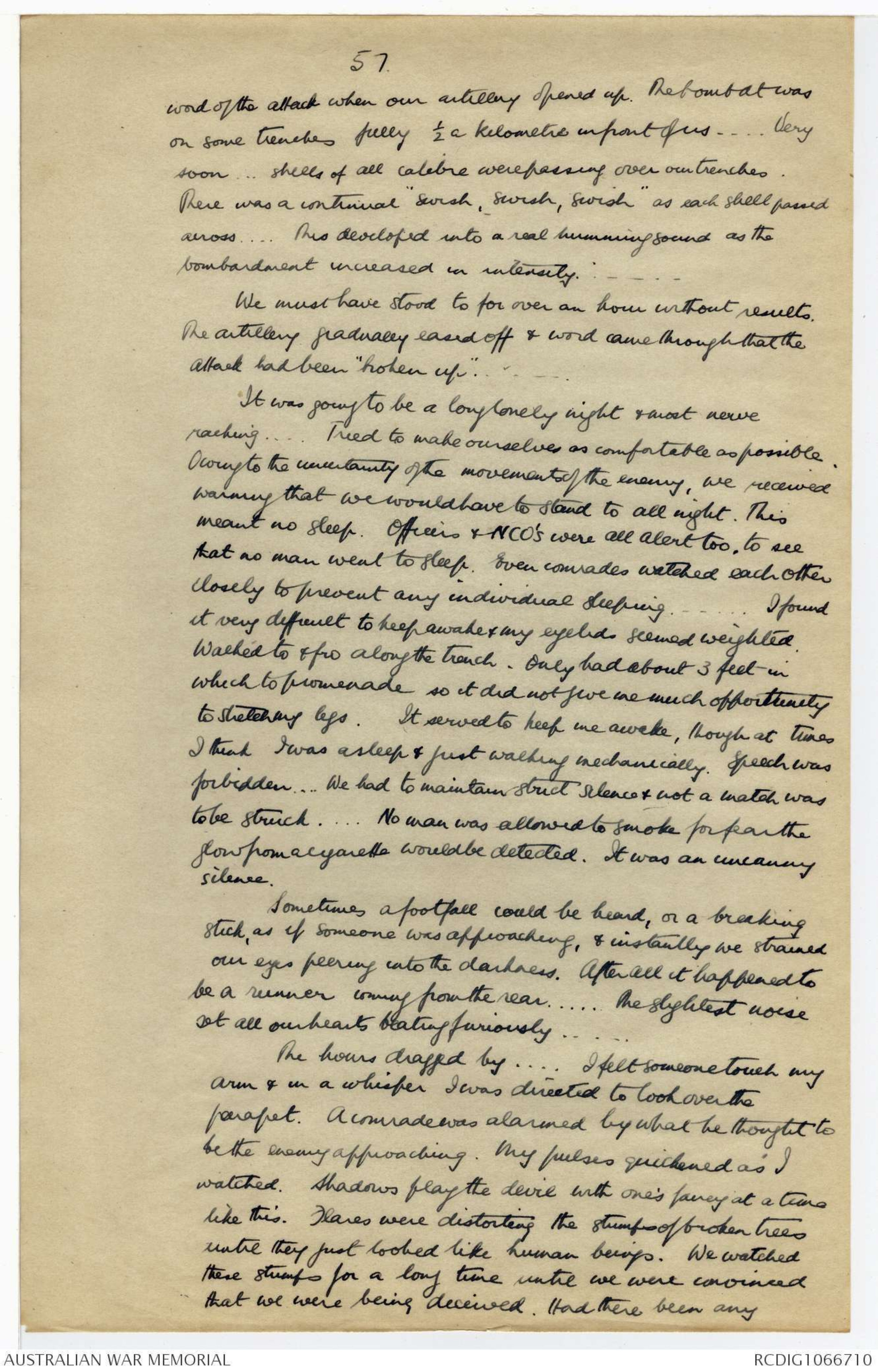
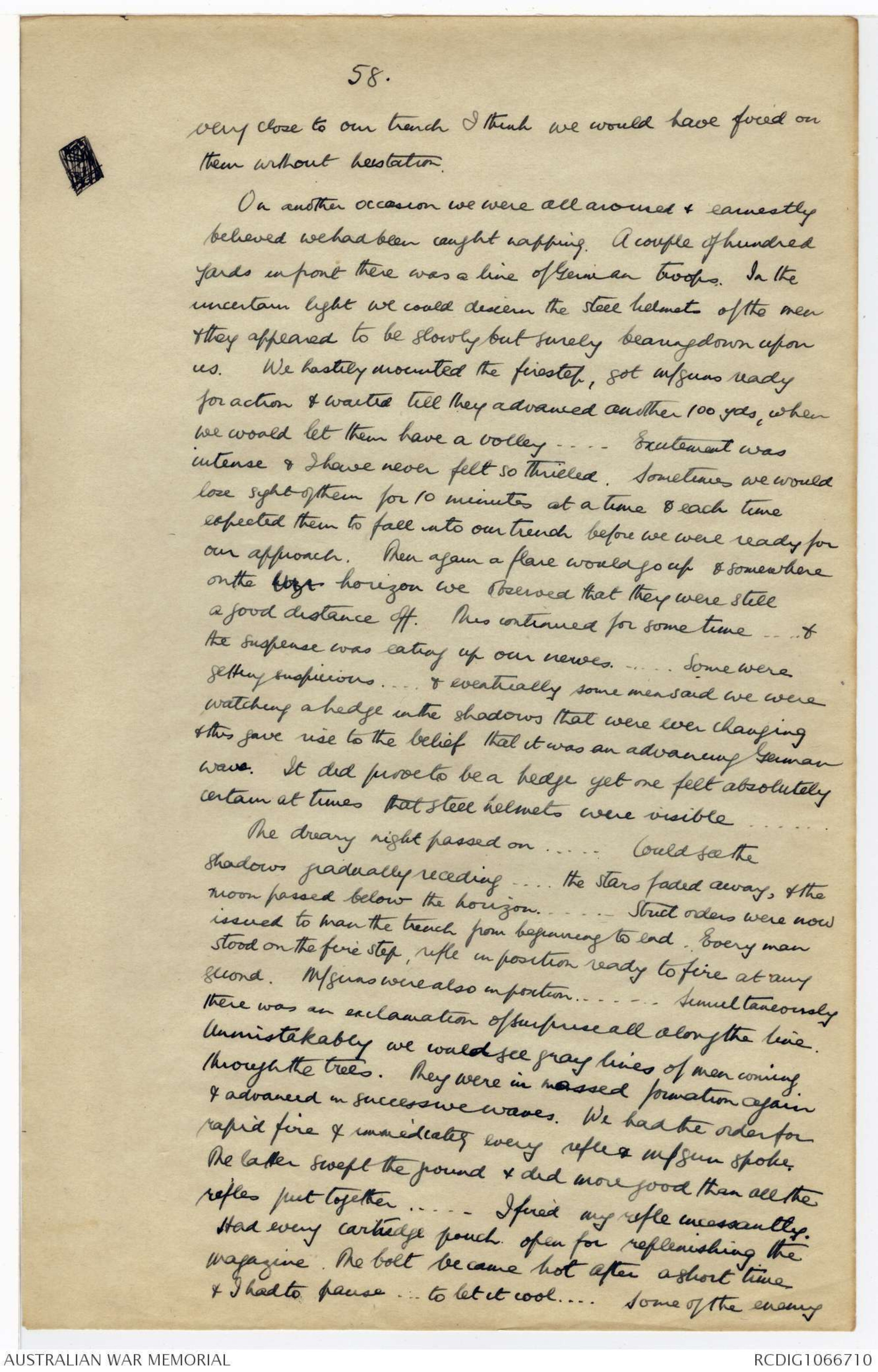
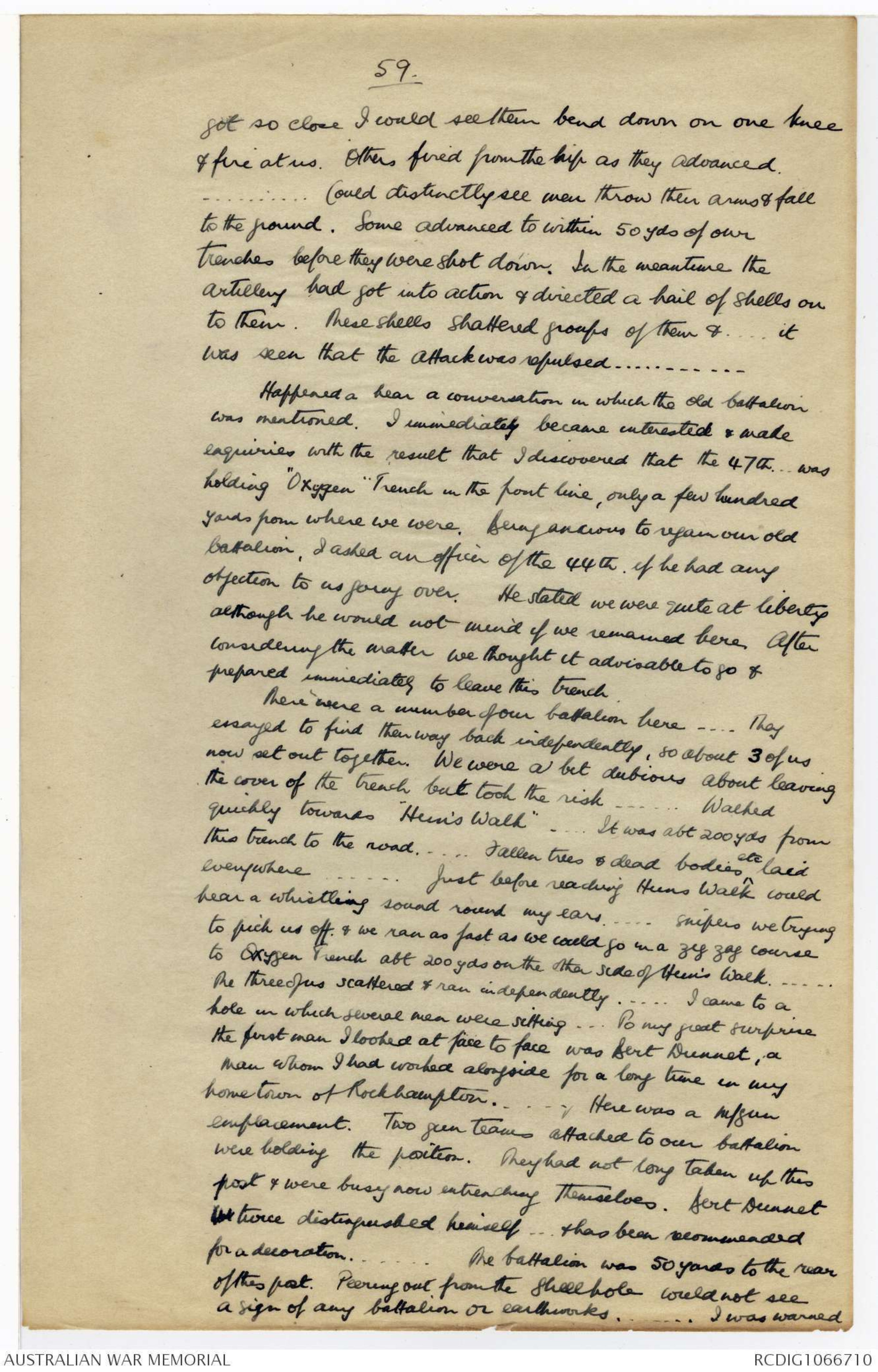
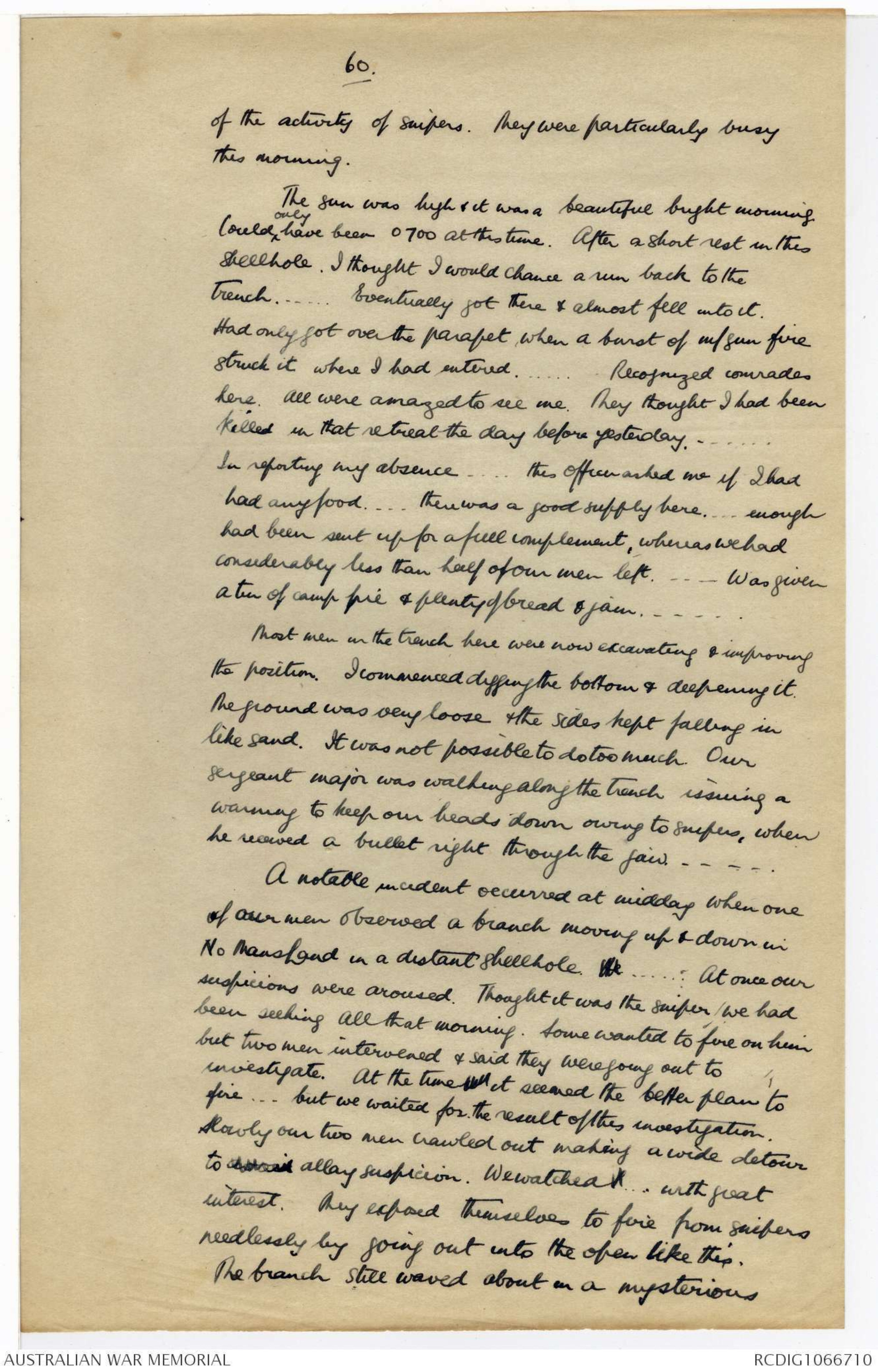
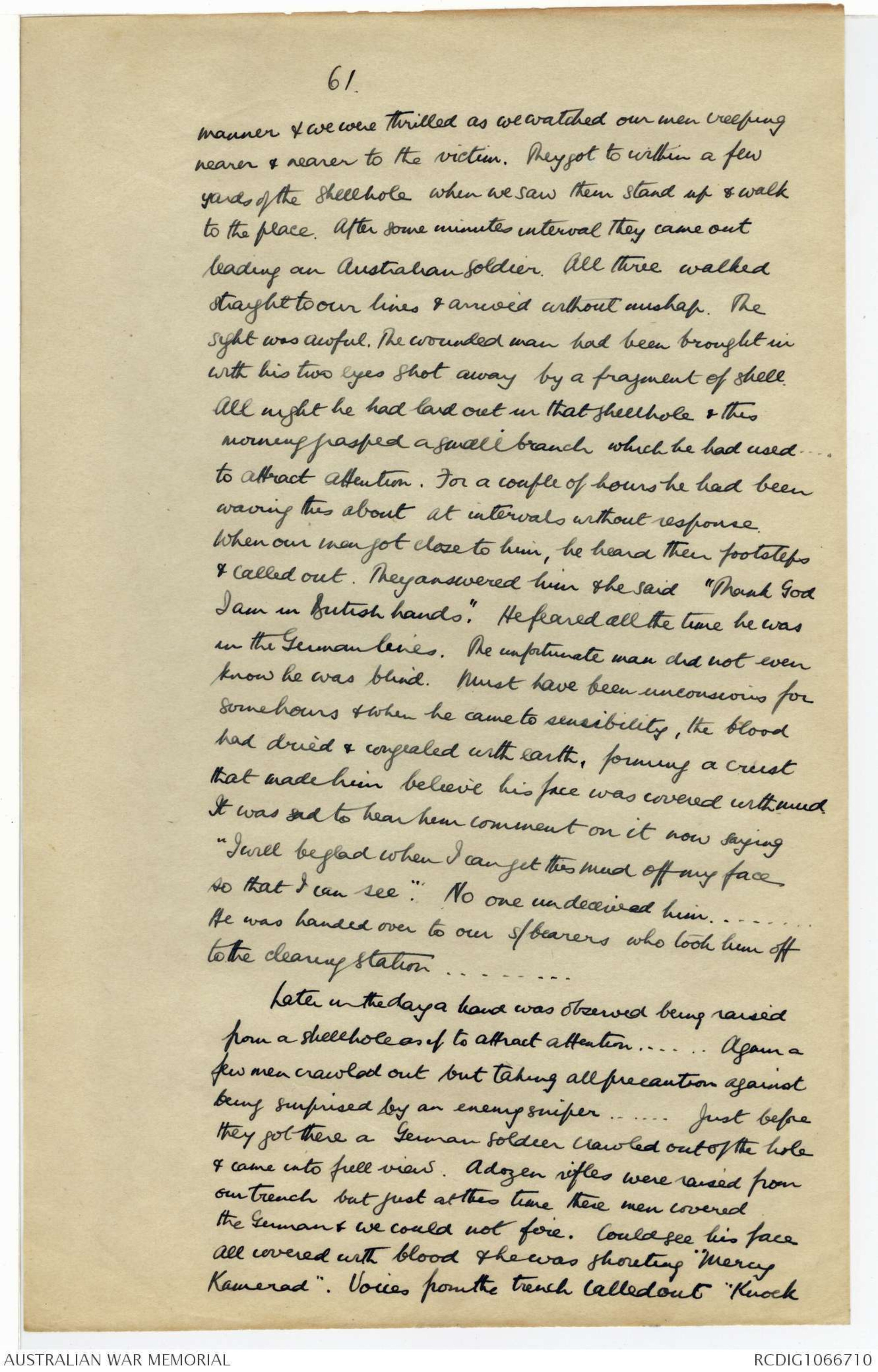
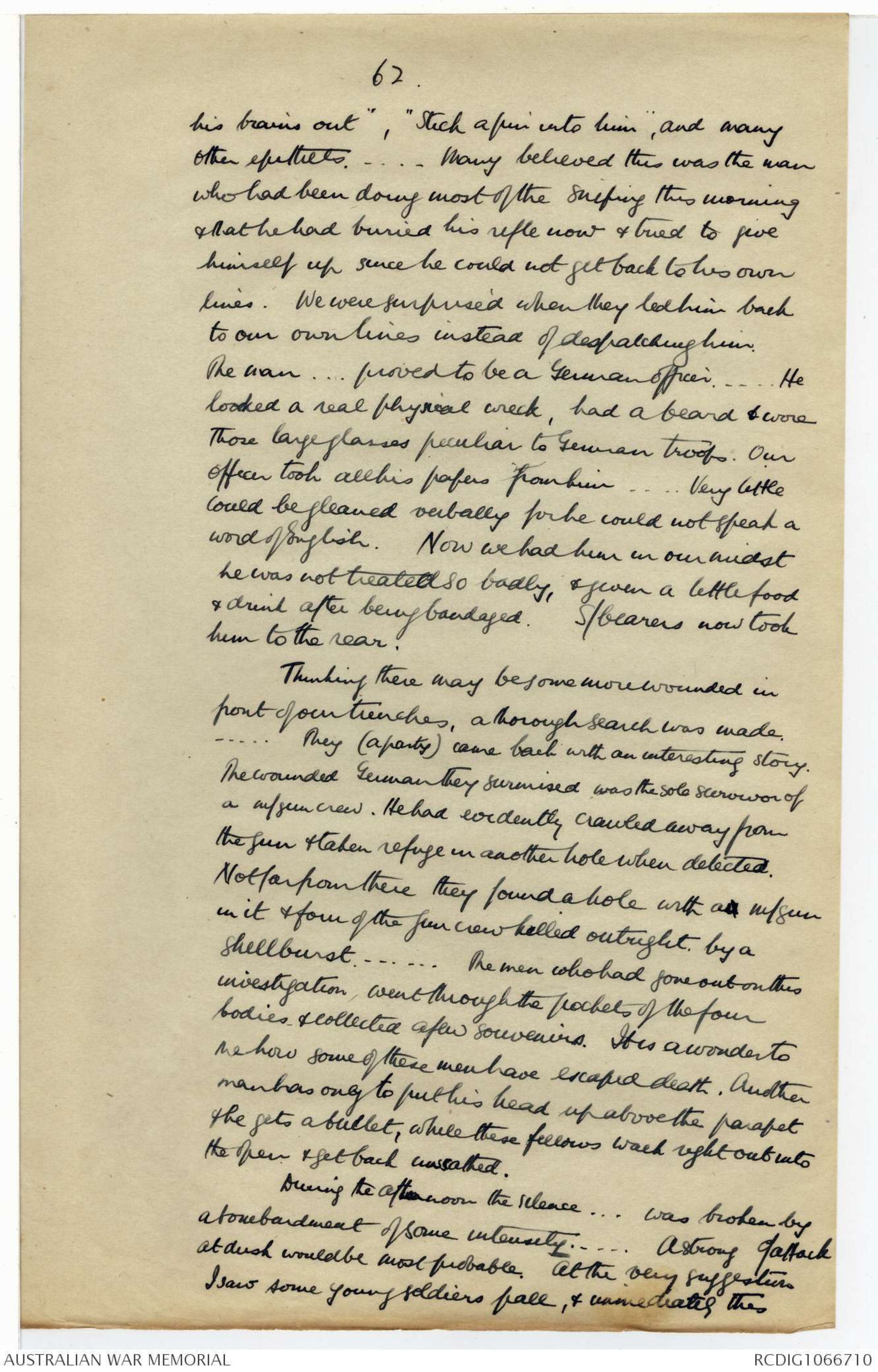
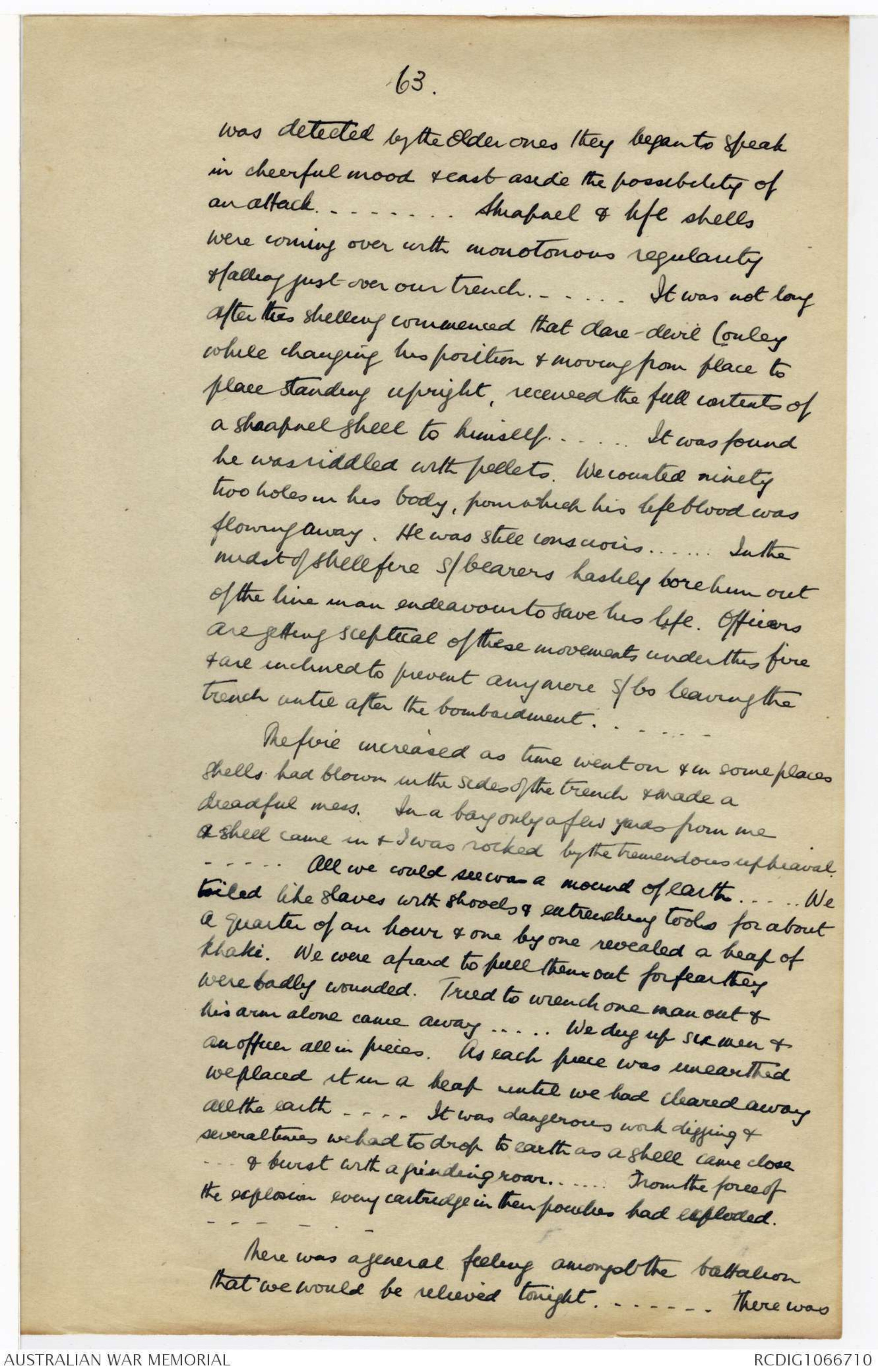
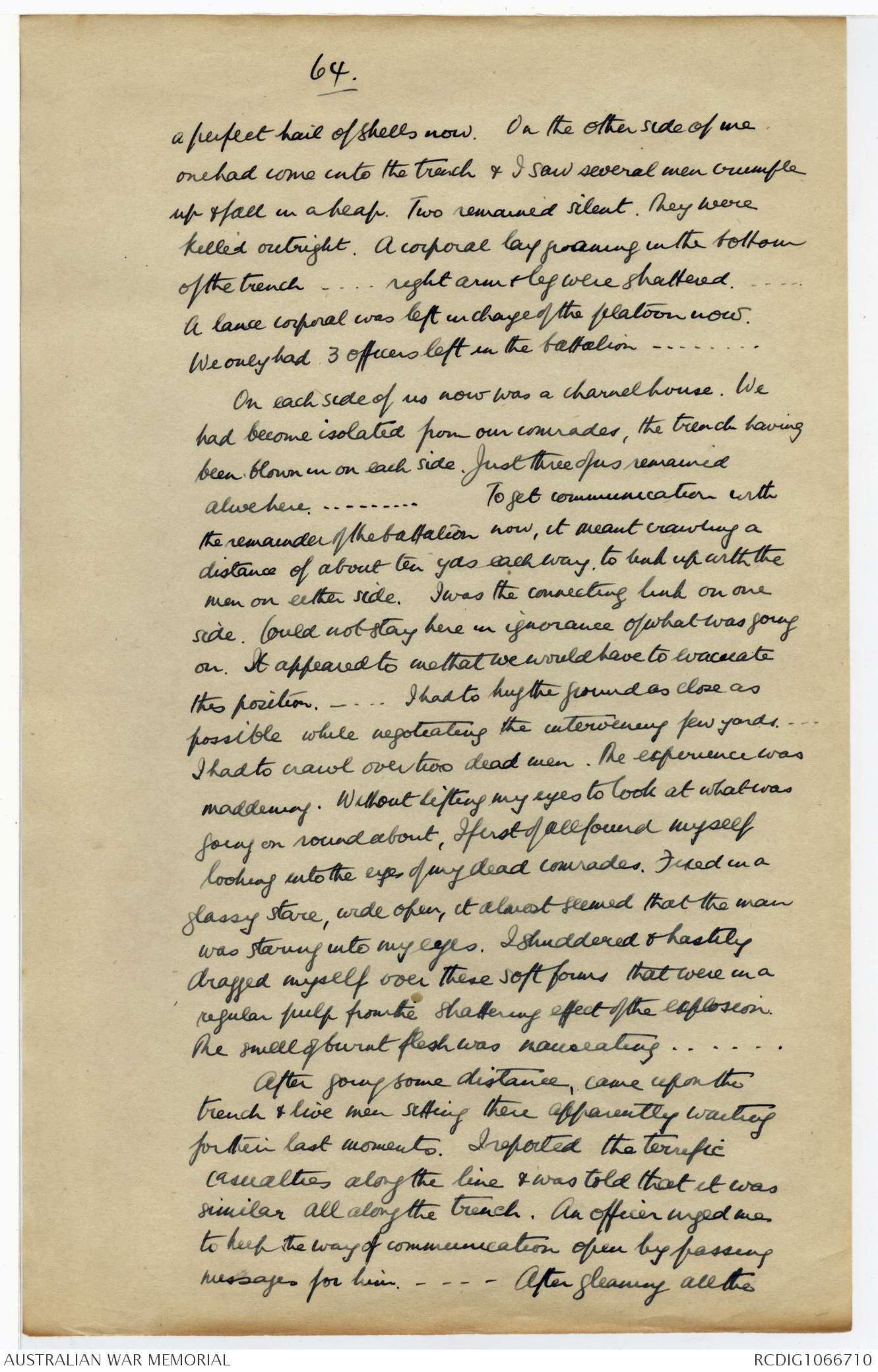
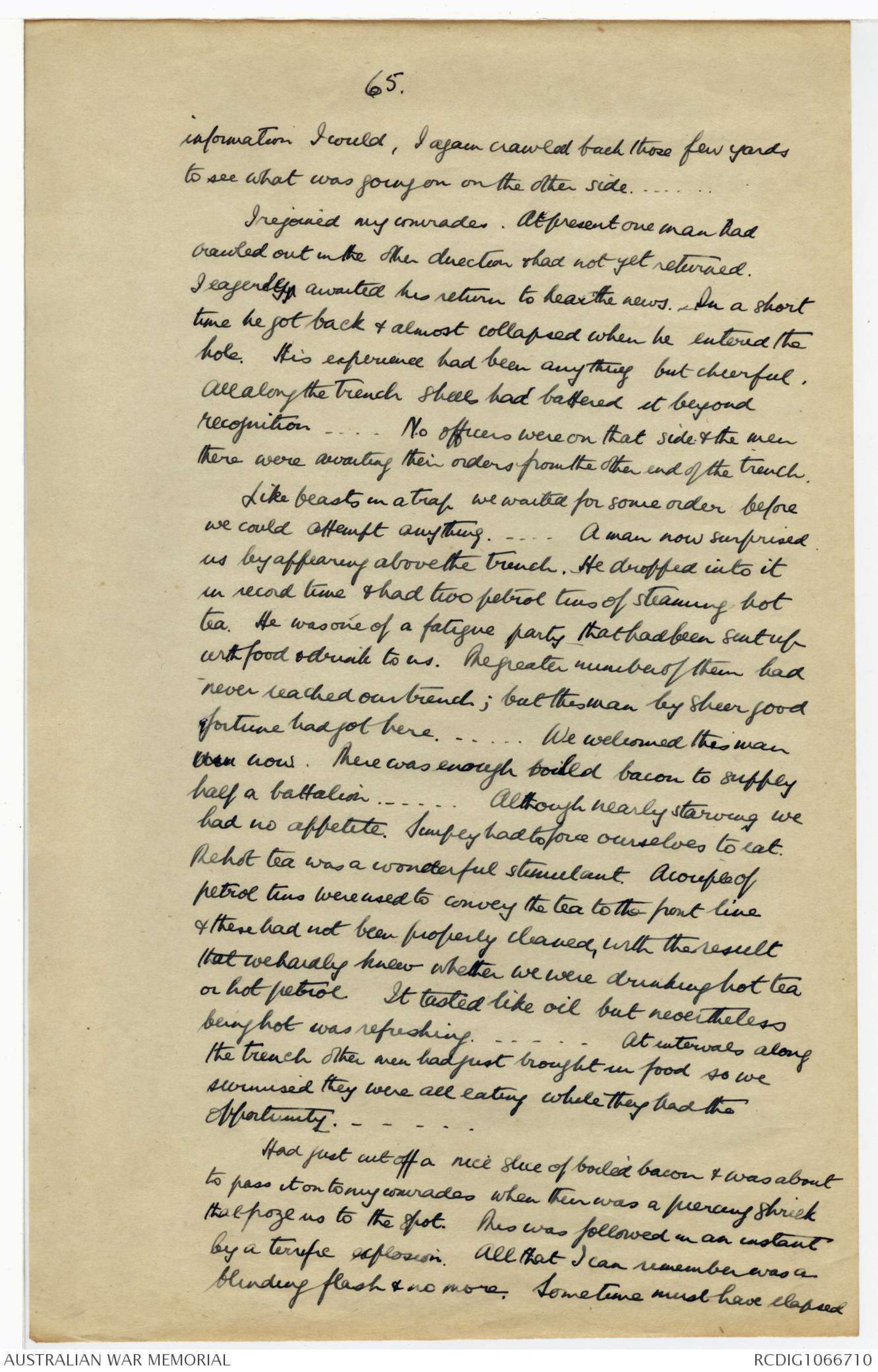
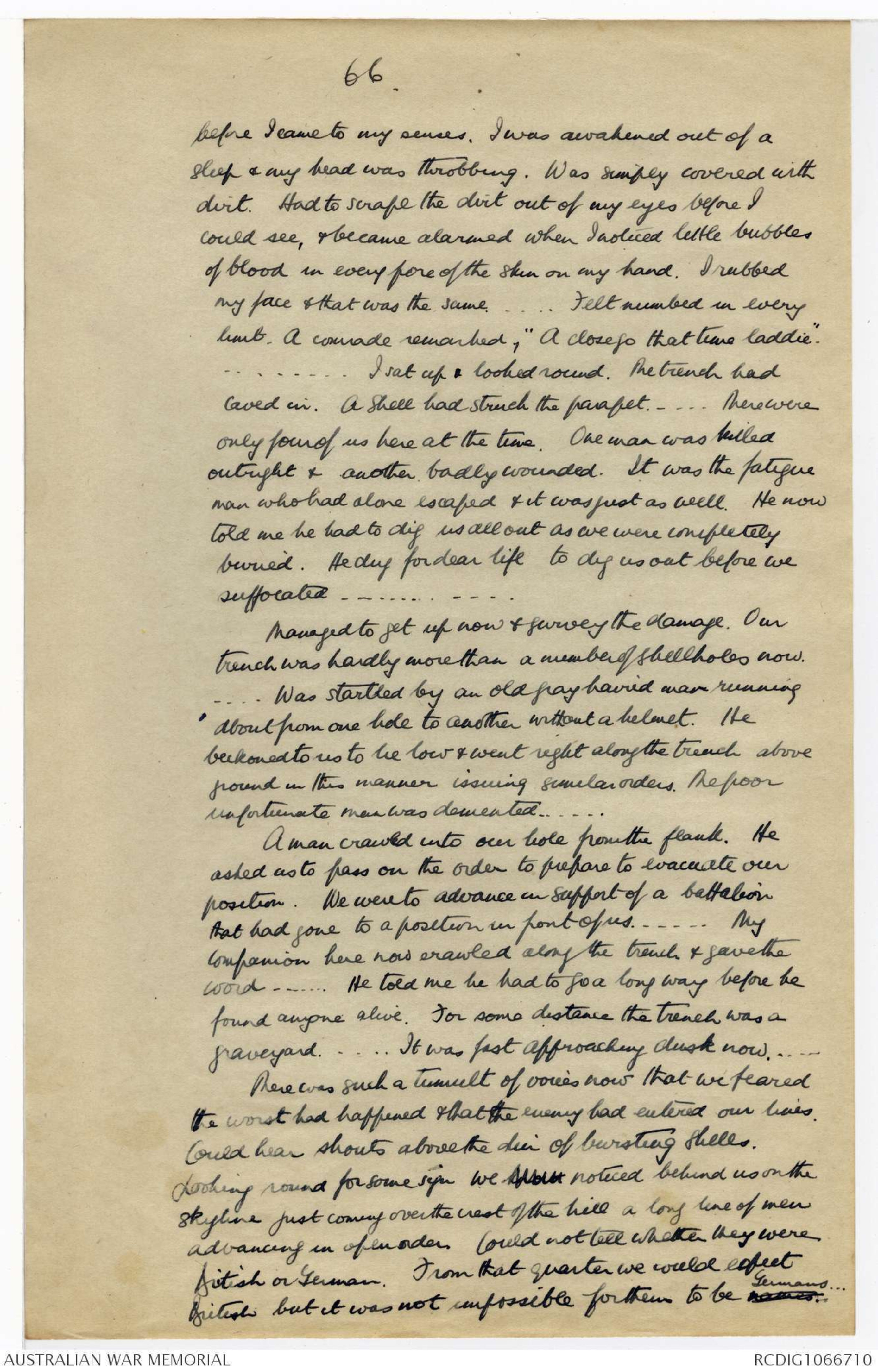
57
word of the attack when our artillery opened up. The bombat was
on some trenches fully ½ a kilometre in front of us . . . Very
soon . . . shells of all calibre were passing over our trenches.
There was a continual “swish, swish, swish” as each shell passed
across. . . . This developed into a real humming sound as the
bombardment increased in intensity . . .
We must have stood to for over an hour without results.
The artillery gradually eased off & word came through that the
attack had been “broken up.”
It was going to be a long lonely night & most nerve
racking . . . . Tried to make ourselves as comfortable as possible.
Owing to the uncertainty of the movements of the enemy, we received
warning that we would have to stand to all night. This
meant no sleep. Officers & NCO’s were all alert too, to see
that no man went to sleep. Even comrades watched each other
closely to prevent any individual sleeping. . . . I found
it very difficult to keep awake & my eyelids seemed weighted.
Walked to and fro along the trench. Only had about 3 feet in
which to promenade so it did not give me much opportunity
to stretch my legs. It served to keep me awake, though at times
I think I was asleep and just walking mechanically. Speech was
forbidden . . . . We had to maintain strict silence & not a match was
struck. . . . No man was allowed to smoke for fear the
glow from a cigarette would be detected. It was an uneasy
silence.
Sometimes a footfall could be heard, or a breaking
stick, as if someone was approaching, & instantly we strained
our eyes peering into the darkness. After all it happened to
be a runner coming from the rear . . . . the slighest noise
set all our hearts beating furiously. . . .
The hours dragged by. . . . I felt someone touch my
arm & in a whisper I was directed to look over to the
parapet. A comrade was alarmed by what he thought to
be the enemy approaching. My pulses quickened as I
watched. Shadows play the devil with one’s fancy at times
like this. Flares were distorting the stumps of broken trees
until they just looked like human human beings. We watched
these stumps for a long time until we were convinced
that we were being deceived. Had there been any
58
very close to our trench I think we would have fired on
them without hesitation.
On another occasion we were all aroused & earnestly
believed we had been caught napping. A couple of hundred
yards in front there was a line of German troops. In the
uncertain light we could discern the steel helmets of the men
& they appeared to be slowly but surely bearing down upon
us. We hastily mounted the firestep, got m/guns ready
for action & waited till they advanced another 100 yds, when
we would let them have a volley . . . . Excitement was
intense & I have never felt so thrilled. Sometimes we would
lose sight of them for 10 minutes at a time & each time
expected them to fall into our trench before we were ready for
our approach. Then again a flare would go up & somewhere
on the xxx horizon we observed that they were still
a good distance off. This continued for some time. . . . &
the suspense was eating up our nerves . . . . Some were
getting suspicious. . . . . & eventually some men said we were
watching a hedge in the shadows that were ever changing
& this gave rise to the belief that it was an advancing German
wave. It did prove to be a hedge yet one felt absolutely
certain at times that steel helmets were visible . . . .
The dreary night passed on . . . . Could see the
shadows gradually receding . . . . the stars faded away, & the
moon passed below the horizon. . . . Strict orders were now
issued to man the trench from beginning to end. Every man
stood on the fire step, rifle in position ready to fire at any
second. M/guns were also in position . . . . Simultaneously
there was an exclamation of surprise all along the line
Unmistakably we could see gray lines of men coming
through the trees. They were in massed formation again
& advanced in successive waves. We had the order for
rapid fire & immediately every rifle & m/gun spoke.
The latter swept the ground & did more good than all the
rifles put together . . . . I fired my rifle incessantly.
Had every cartridge pouch open for replenishing the
magazine. The bolt became hot after a short time
& I had to pause . . . . to let it cool . . . . Some of the enemy
59
got so close I could see them bend down on one knee
& fire at us. Others fired from the hip as they advanced.
. . . . Could distinctly see men throw their arms & fall
to the ground. Some advanced to within 50 yds of our
trenches before they were shot down. In the meantime the
artillery had got into action & directed a hail of shells on
to them. These shells shattered groups of them & . . . . it
was seen that the attack was repulsed . . . .
Happened to hear a conversation in which the old battalion
was mentioned. I immediately became interested & made
enquiries with the result that I discovered that the 47th. . . . was
holding “Oxygen” Trench in the front line, only a few hundred
yards from where we were. Being anxious to regain our old
Battalion, I asked an officer of the 44th. if he had any
objection to us going over. He stated we were quite at liberty
although he would not mind if we remained here. After
considering the matter we thought it advisable to go &
prepared immediately to leave this trench.
There were a number of our battalion here . . . . They
essayed to find their way back independently, so about 3 of us
now set out together. We were a bit dubious about leaving
the cover of the trench but took the risk . . . . Walked
quickly towards "Hun's Walk" . . . . It was abt 200 yds from
the trench to the road . . . . Fallen trees & dead bodies ^etc laid
everywhere . . . . Just before reaching Huns Walk could
hear a whistling sound around my ears . . . . snipers we trying
pick us off. & we ran as fast as we could go in a zig zag course
to Oxygen Trench abt 200 yds on the other side of Hun's Walk. . . .
the three of us scattered & ran independently . . . . I came to a
hole in which several men were sitting . . . . To my great surprise
the first man I looked at face to face was Bert Dunnet, a
man whom I had worked alongside for a long time in my
home town of Rockhampton. . . . Here was a m/gun
emplacement. Two gun teams attached to our battalion
were holding the position. They had not long taken up this
post & were busy now entrenching themselves. Bert Dunnet
ws twice distinguished himself . . . & has been recommended
for a decoration. . . . The battaliion was 50 yds to rear
of this post. Peering out from the shellhole could not see
a sign of any battalion or earthworks . . . . I was warned
60
of the activity of snipers. They were particularly busy
this morning.
The sun was high & it was a beautiful bright morning.
Could ^only have been 0700 at this time. After a short rest in this
shellhole, I though I would chance a run back to the
trench . . . . Eventually got there & almost fell into it.
Had only got over the parapet, when a burst of m/gun fire
struck it where I had entered. . . . Recognised comrades
here. All were amazed to see me. They thought I had been
killed in that retreat the day before yesterday. . . .
In reporting my absence . . . . the officer asked me if I had
had any food . . . . there was a good supply here . . . . enough
had been sent up for a full complement, whereas we had
considerably less than half of our men left. . . . Was given
a tin of camp pie & plenty of bread & jam. . . .
Most men in the trench here were now excavating & improving
the position. I commenced digging the bottom & deepening it.
The ground was very loose & the sides kept falling in
like sand. It was not possible to do too much. Our
sergeant major was walking along the trench issuing a
warning to keep our heads down owing to snipers, when
he received a bullet right through the jaw . . . .
A notable incident occurred at midday when one
of our men observed a branch moving up & down in
No MansLand in a distant shellhole. We . . . . At once our
suspicions were aroused. Thought it was the sniper we had
been seeking all that morning. Some wanted to fire on him
but two men intervened & said they were going out to
investigate. At the time we it seemed the better plan to
fire . . . . but we waited for the result of this investigation.
Slowly our two men crawled out making a wide detour
to avoid allay suspicion. We watched t . . . . with great
interest. They exposed themselves to fire from snipers
needlessly by going out into the open like this.
The branch still waved about in a mysterious
61
manner & we were thrilled as we watched our men creeping
near & nearer to the victim. They got to within a few
yards of the shellhole when we saw them stand up & walk
to the place. After some minutes interval they came out
leading an Australian soldier. All three walked
straight to our lines & arrived without mishap. The
sight was awful. The wounded man had been brought in
with his two eyes shot away by a fragment of shell.
All night he had laid out in that shellhole & this
morning grasped a small branch which he had used . . . .
to attract attention. For a couple of hours he had been
waving this about at intervals without response.
When our men got close to him he heard their footsteps
& called out. They answered him & he said "Thank God
I am in British hands." He feared all the time he was
in the German lines. The unfortunate man did not even
know he was blind. Must have been unconscious for
some hours & when he came to sensibility, the blood
had dried & congealed with earth, forming a crust
that made him believe his face was covered with mud.
It was sad to hear him comment on it now saying
"I will be glad when I can get this mud off my face
so that I can see." No one undeceived him . . . .
He was handed over to our s/bearers who took him off
to the clearing station . . . .
Later in the day a hand was observed being raised
from a shellhole as if to attract attention . . . . Again a
few men crawled out but taking all precaution against
being surprised by an enemy sniper . . . . Just before
they got there a German soldier crawled out of the hole
& came into full view. A dozen rifles were raised from
our trench but just at this time these men covered
the German & we could not fire. Could see his face
all covered with blood & he was shouting "Mercy
Kamerad." Voices from the trench called out "Knock
62
his brains out," "Stick a pin into him," and many
other epithets. . . . Most believed this was the man
who had been doing most of the sniping this morning
& that he had buried his rifle now & tried to give
himself up since he could not get back to his own
lines. We were surprised when they led him back
to our own lines instead of despatching hiim.
The man . . . , proved to be a German officer . . . . He
looked a real physical wreck, had a beard & wore
those large glasses peculiar to German troops. Our
officer took all his papers from him . . . . Very little
could be gleaned verbally for he could not speak a
word of English. Now we had him in our midst
he was not treated so badly, & given a little food
& drink after he had been bandaged. S/bearers now took
him to the rear.
Thinking there may be some more wounded in
front of our trenches, a thorough search was made.
. . .. They (a party) came back with an interesting story.
The wounded German they surmised was the sole survivor of
a m/gun crew. He had evidently crawled away from
the gun & taken refuge in another hole when detected.
Not far from there they found a hole with an m/gun
in it & four of the gun crew killed outright by a
shellburst. . . .The men who had gone out on this
investigation went through the pockets of the four
bodies & collected a few souvenirs. It is a wonder to
me how some of these men have escaped death. Another
man has only to put his head up above the parapet
& he gets a bullet, while these fellows walk right out into
the open & get back unscathed.
During the afternoon the silence . . . . was broken by
a bombardment of some intensity . . . . A strong c/attack
at dusk would be most probable. At the very suggestion
I saw some young soldiers pale, & immediately this
63
was detected by the older ones, they began to speak
in a cheerful mood & cast aside the possibility of
an attack . . . .Shrapnel & h/e shells
were coming over with monotonous regularity
& falling just over our trench . . . . It was not long
after the shelling commenced that dare-devil Conley
while changing his position & moving from place to
place standing upright, received the full contents
of a shrapnel shell to himself . . . . It was found
he was riddled with pellets. We counted ninety
two holes in his body, from which his lifeblood was
flowing away. He was still conscious . . . . In the
midst of shellfire s/bearers hastily bore him out
of the line in an endeavour to save his life. Officers
are getting sceptical of these movements under this fire
& are inclined to prevent any more s/bearers leaving the
trench after the bombardment . . . .
The fire increased as time went on & in some places
shells had blown in the sides of the trench & made a
dreadful mess. In a bay only a few yards from me
a shell came in & I was rocked by the tremendous upheaval.
. . . . All we could see was a mound of earth . . . . We
toiled like slaves with shovels & entrenching tools for about
a quarter of an hour & one by one revealed a heap of
khaki. We were afraid to pull them out for fear they
were badly wounded. Tried to wrench one man out &
his arm alone came away . . . . We dug up six men &
an officer all in pieces. As each piece was unearthed
we placed it in a heap until we had cleared away
all the earth . . . . It was dangerous work digging &
several times we had to drop to earth as a shell came close
. . . . & burst with a grinding roar . . . . From the force of
the explosion every cartridge in their pouches had exploded.
There was a general feeling amongst the battalion
that we would be relieved tonight . . . . there was
64
a perfect hail of shells now. On the other side of me
one had come into the trench & I saw several men crumple
up & fall in a heap. Two remained silent, they were
killed outright. A corporal lay groaning in the bottom
of the trench. . . . right arm & leg were shattered. . . .
A lance corporal was left in charge of the platoon now.
We only had 3 officers left in the battalion . . . .
On each side of us now was a charnel house. We
had become isolated from our comrades, the trench having
been blown in on each side. Just three of us remained
alive here . . . . To get communication with
the remainder of the battalion now, it meant crawling a
distance of about ten yds each way, to link up with
the men on either side. I was the connecting link on one
side. Could not stay here in ignorance of what was going
on. It appeared to me that we would have to evacuate
this position. . . . I had to hug the ground as close as
possible while negotiating the intervening few yards.
I had to crawl over two dead men. The experience was
maddening. Without lifting my eyes to look at what was
going on round about, I first of all found myself
looking into the eyes of my dead comrades. Fixed in a
glassy stare, wide open, it almost seemed that the man
was staring into my eyes. I shuddered & hastily
dragged myself over these soft forms that there in a
regular pulp from the shattering effect of the explosion.
The smell of burnt flesh was nauseating. . . .
After going some distance, came upon the
trench & live men sitting there apparently waiting
for their last moments. I reported the terrific
casualties along the line & was told it was
similar all along the trench. An officer urged me
to keep the way of communication open by passing
messages for him. . . . After gleaning all the
65
information I could, I again crawled back those few yards
to see what was going on on the other side . . . .
I rejoined my comrades. At present one man had
crawled out in the other direction & had not yet returned.
I eagerly awaited his return to hear the news. In a short
time he got back & almost collapsed when he entered the
hole. His experience had been anything but cheerful.
All along the trench shells had battered it beyond
recognition . . . . No officers were on that side & the men
there were awaiting their orders from the other end of the trench.
Like beasts in a trap, we waited for some order before
we could attempt anything. . . . A man now surprised
us by appearing above the trench. He dropped into it
in record time & had two petrol tins of steaming hot
tea. He was one of a fatigue party that had been sent up
with food & drink to us. The greater number of them had
never reached our trench; but this man by sheer good
fortune had got here. . . . We welcomed this man
then now. There was enough boiled bacon to supply
half a battalion . . . . Although nearly starving we
had no appetite. Simply had to force ourselves to eat.
The hot tea was a wonderful stimulant. A couple of
petrol tins were used to convey the tea to the front line
and these had not been properly cleaned, with the result
that we hardly knew whether we were drinking hot tea
or hot petrol. It tasted like oil but nevertheless
being hot was refreshing. . . . At intervals along
the trench other men had just brought in food so we
surmised they were all eating when they had the
opportunity. . . .
Had just cut off a nice slice of boiled bacon & was about
to pass it on to my comrades when there was a piercing shriek
that froze us to the spot. This was followed in an instant
by a terrific explosion. All that I can remember was a
blinding flash & no more. Some time must have elapsed
66
before I came to my senses. I was awakened out of a
sleep & my head was throbbing. Was simply covered with
dirt. Had to scrape the dirt out of my eyes before I
could see, & became alarmed when I noticed little bubbles
of blood in every pore of the skin on my hand. I rubbed
my face & that was the same. . . . Felt numbed in every
limb. A comrade remarked, "A close go that time laddie."
. . . . I sat up & looked round. The trench had
caved in. A shell had struck the parapet . . . . there were
only four of us in here at the time. One man was killed
outright & another badly wounded. It was the fatigue
man who had alone escaped & it was just as well. He now
told me he had to dig us all out as we were completely
buried. He dug for dear life to dig us out before we
suffocated . . . .
Managed to get up now & survey the damage. Our
trench was hardly more than a number of shellholes now.
. . . .Was startled by an old gray haired man running
about from one hole to another without a helmet. He
beckoned to us to lie low & went right along the trench above
ground in this manner, issuing similar orders. The poor
unfortunate man was demented. . . .
A man crawled into our hole from the flank. He
asked us to pass on the order to prepare to evacuate our
position. We were to advance in support of a battalion
that had gone to a position in front of us. . . .My
companion here now crawled along the trench & gave the
word . . . . he told me he had to go a long way before he
found anyone alive. For some distance the trench was a
graveyard. . . . It was fast approaching dusk now. . . .
There was such a tumult of voices now that we feared
that the worst had happened & that the enemy had entered our lines.
Could hear shouts above the din of bursting shells.
Looking round for some sign we xxxx noticed behind us on the
skyline just coming over the crest of the hill a long line of men
advancing in open order. Could not tell whether they were
British or German. From that quarter we would expect
British but it was not impossible for them to be names Germans.
 Transcriber 77
Transcriber 77This transcription item is now locked to you for editing. To release the lock either Save your changes or Cancel.
This lock will be automatically released after 60 minutes of inactivity.